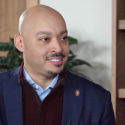Ad hoc study group completes work, recommends steps to ensure success of Black students, faculty and staff
Last year, after a video of a student making racist comments surfaced online, Chancellor Jennifer L. Mnookin tasked a campus ad hoc group with studying the Black experience at the University of Wisconsin–Madison and recommending steps the campus community could take to positively influence that experience. The Ad Hoc Study Group on the Black Community Experience on the UW–Madison Campus has now completed its work.
The group’s wide-ranging recommendations, contained in its final report, include enhanced recruiting and retention strategies, the formation of advisory councils, more outreach to Black alumni, and increased support for the Rebecca M. Blank Center for Campus History.
Mnookin has tasked Vice Chancellor for Inclusive Excellence LaVar Charleston with taking the lead in reviewing the study group’s recommendations and determining next steps for acting on them. Many of the recommendations cut across campus units and university leaders anticipate that engagement from multiple partners will be critical in determining how to achieve the goal of a stronger climate for the members of the Black community. While Mnookin and Charleston believe that some of the specific recommendations will be actionable, some may also need additional review for legal considerations in light of the U.S. Supreme Court’s decision last summer on the use of race and ethnicity in admissions.
“I want to thank the members of the study group for their thoughtful work on this crucial issue,” Mnookin says. “I also want to express my deep gratitude to the members of the Blk Pwr Coalition and other student leaders, whose advocacy on this issue played a significant role in prompting us to take on this important effort. Over the years, the university has undertaken a variety of efforts to support underrepresented minority members of our campus community — a number of which are described in thoughtful detail in the study group’s report — but we recognize, and the ad hoc report confirms, that we still have much work to do.”
Mnookin formed the ad hoc study group in the summer of 2023, both as a response to longstanding issues and in the wake of the video, which sparked student protests and the formation of the Blk Pwr Coalition, a student advocacy group.
The study group’s conclusions and strategic recommendations will inform future efforts to meaningfully address the concerns identified in the report, Mnookin says. Charleston will convene a working group to develop actionable responses to those recommendations that can be implemented in the near term while also providing a road map to success for longer-term initiatives.
The 15 members of the ad hoc study group included students, faculty, staff and community members. Several members of the committee are also UW–Madison alumni. The group was co-chaired by Professor Angela Byars-Winston and the Rev. Dr. Alex Gee.
Byars-Winston is a professor in the Division of General Internal Medicine within the Department of Medicine and the inaugural chair of the University of Wisconsin Institute for Diversity Science. Gee, a UW–Madison alumnus, is the founder of the Center for Black Excellence and Culture, president and founder of the Nehemiah Center for Urban Leadership Development, and lead pastor of Fountain of Life Church in Madison.
In a joint statement, Byars-Winston and Gee thanked their fellow study group members for bringing wisdom, energy and hopefulness to a difficult subject.
“We believe UW–Madison can become the institution we all want it to be — one that uplifts its Black community in the grandest tradition of the Wisconsin Idea,” the co-chairs said. “The recommended strategies in this report are aimed at fostering a university culture where Black individuals do not just survive but thrive.”
The report’s executive summary says Mnookin encouraged the committee to prioritize actionable items that range from the readily achievable to more complex initiatives that address the root causes of the issues at hand, thereby paving the way for substantive and sustainable change.
“Chancellor Mnookin tasked the committee with a strategic and layered approach: to develop tiered recommendations encompassing immediate actions she could implement unilaterally, collaborative efforts that might take longer to realize, and ambitious systemic changes that would require extensive time and resources to achieve,” the executive summary says. “This charge underscores the commitment to pragmatic and phased solutions, recognizing the different scopes and timelines necessary to effect genuine transformation.”
Tags: chancellor



